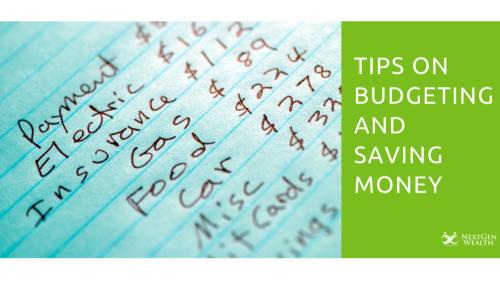Tips on Budgeting and Saving Money
Budgeting and saving money are closely related because budgeting is the most effective tool people use to save money. And no, budgeting isn’t just about tightening the belt and spending less. It’s about putting your money to work for you so that you prioritize and spend on the things that are most important.
So today I will be sharing with you some of the most effective tips that you can use to be successful when it comes to budgeting and saving money.
Create A Zero Based Budget
The first you can do is learn how to make a monthly budget. But creating a budget is a lot more than simply deciding you will only spend $400 on food this month. You see, a budget is a spending plan. It forces you to prioritize and make decisions and tradeoffs for how you want to spend your time and money.
For example, if you have $250 to spend every month on discretionary items but you HATE cleaning, then the budget gives you permission to use some of that money to hire someone to clean your place.
By focusing on the things you enjoy, and prioritizing them in your budget, you will be happier. As a well known Harvard researcher says, ‘if money doesn’t make you happy, then you aren’t spending it right.’
By realizing that the budget is the tool that allows you to make the best decisions with your money, you’ll be more likely to stick with it. The spending plan is only part of the benefit. You’ll also want to remember that making a budget and sticking to it gets easier over time.
So if at first you don’t enjoy the process, give it some time. You’ll warm up to it when you start seeing yourself build wealth. Money talks. You just have to listen.
But you don’t want to build just any old budget. You’ll want a zero-based budget. It simply means that you’ll pay yourself first.
Pay Yourself First To Boost Your Wealth
If you have goals or dreams of having a comfortable retirement, then you need to prioritize it. And this means paying yourself first. Most people pay themselves last.
What this means is that they’ll go to work and receive a paycheck. Once they get the paycheck they’ll pay all of their bills, and then they’ll save and invest whatever they have left.
If you only save and invest whatever is leftover, you’ll be waiting to retire for the rest of your life. The #1 thing you can do to increase your ability to save and invest money is to automate it. Take willpower and chance out of the equation.
If your employer offers a 401(k) retirement savings plan, you need to sign up for automatic payroll deductions immediately. Don’t even get used to that money going into your bank account.
You should also decide the amount you want to save or invest, and set up your direct deposit at work to split your check between two accounts. One for spending, and one for saving. Again, you want to automate as many things as you can.
By relying on willpower you’ll be more likely to make less than optimal choices. Once you have that money set aside, open an IRA (Roth or Traditional). If this isn’t ringing any bells, you need to learn what is an IRA.
If you aren’t sure how much you need to save every month for retirement, use this easy retirement calculator to find out. It’ll give you a goal to shoot for on a monthly basis.
Now that we’ve covered how to crush a budget, let’s focus on actionable ways to save money.
Leverage Your Public Library For Books and Movies
We all pay a lot of tax dollars, yet most people don’t even take advantage of one of the most awesome resources. Little utilized, your local public library has tons of awesome resources. I always assumed that the library wouldn’t have the books I’d want to read (like Shoe Dog, the best selling memoir about the founding of Nike).
However, most public libraries will purchase books upon request. This means that if there’s a book that is not in circulation that you want to read, you can request it and see if they will purchase it for you. For someone who loves to read, learn, and grow on a daily basis, this can save you a pretty penny.
If you hate books, don’t worry. Libraries also have a catalog of movies you can borrow. No need for a Netflix subscription or an expensive trip to the movie theater when you can do it for free (well technically, you paid for it with your tax dollars)!
Get Paid To Shop For The Things You Normally Buy
If you do the majority of your shopping online and aren’t a member of the rewards cash-back program Ebates, then you have been missing out on free money. Yes, literally free money. Ebates sounds kind of sketchy but it’s 100% legit, real, and used by millions of people to save a ton of money.
All you have to do is pop over to the site (they also have a Chrome browser plugin, but I’ve never used it), and select the store you want to purchase at. It’ll then take you the webpage for the stores you normally shop at, like Macy’s, Kohls, Urban Outfitters, Barneys, etc. and boom. You’ll get cash back upon checkout.
Here’s what I do: I’ll shop the way I normally do and once I know what I want to purchase at a specific site, I will go to Ebates, check to see if the store I want to purchase from is offering cashback (90% of the time they are). If they are, I will click the store and then complete my purchase as normal.
That’s all it takes to save money when purchasing the things you already are buying. It’s so simple yet so many people don’t do it. You can even use my referral code for $10 in cash back after your first $25 purchase: https://www.ebates.com/r/CMALDS?eeid=28187. And no, I don’t work at Ebates. I just love saving money.
Never Walk Into A Grocery Store Without A List
Lastly, this is advice we all know, yet I barely see people carrying a shopping list at the grocery store. There’s a reason people have said to make lists since grocery stores were invented. It’s because it works.
Come up with meals you want to make for the week and list down the ingredients. Do NOT under any circumstances go to the grocery store and decide what to buy on the spot. You’ll end up with mac and cheese and frozen pizzas.
Both are fine in moderation, but you need to act like an adult and eat healthy. You need to take care of your health! The savings in health care dollars alone make this well worth it.
Not giving into your whims at the store will also save you a ton of money. No more buying chocolate bars or gum at the checkout.
So before you go, create a list and don’t come home with anything that wasn’t on the list. You’ll be amazed at how much you’ll save.
The reason this is so important is that food is typically one of the 3 largest monthly spend categories after rent and utilities, so saving here can make a huge impact on your ability to save and invest money. It will also help you eat more meals at home, which is way more affordable than grabbing Chipotle after work.
Building wealth is a marathon, not a sprint. And just like an endurance race, you have to train and build healthy money habits. The good news is that if you employ these 5 tips and incorporate them into your life, you’ll be well on your path.
This was a guest post from Camilo Maldonado over at The FinanceTwins.com.
Camilo Maldonado is the co-founder of TheFinanceTwins.com, a website that helps thousands of people learn about personal finance. Growing up poor, Camilo learned at an early age that he needed to become an expert in personal finance so that he wouldn't have to live paycheck to paycheck. Now he wants to pass everything he learned on to his readers. Camilo earned an M.B.A. from Harvard and a B.S.E. from the Wharton School of Business.


